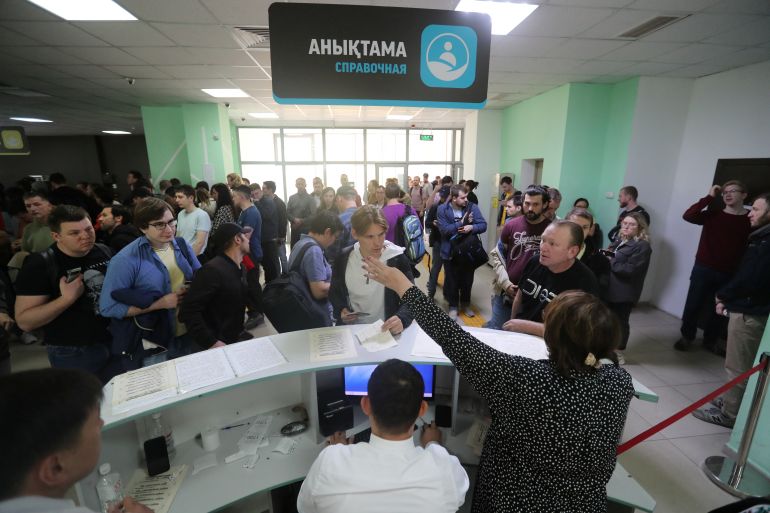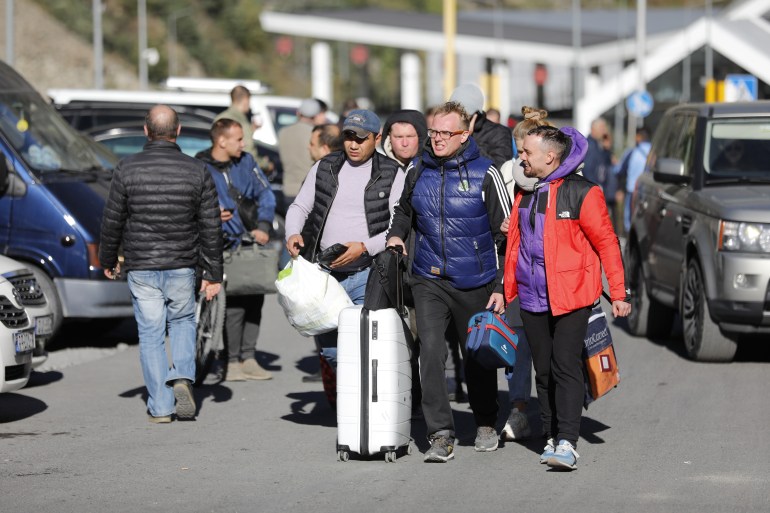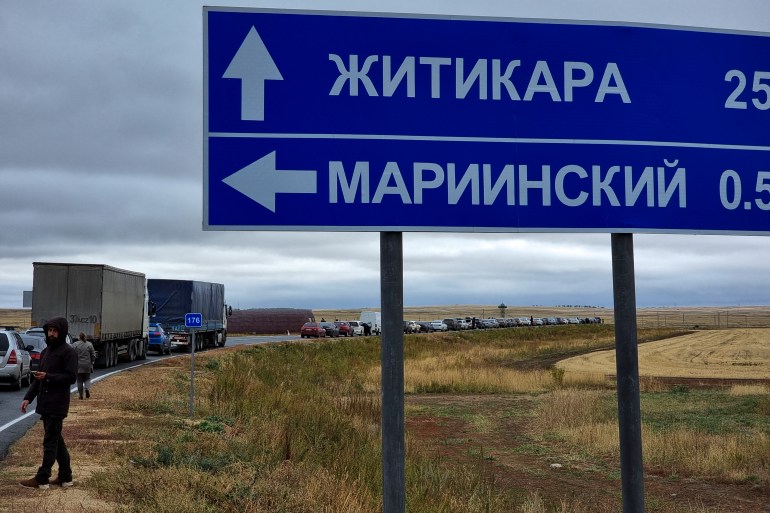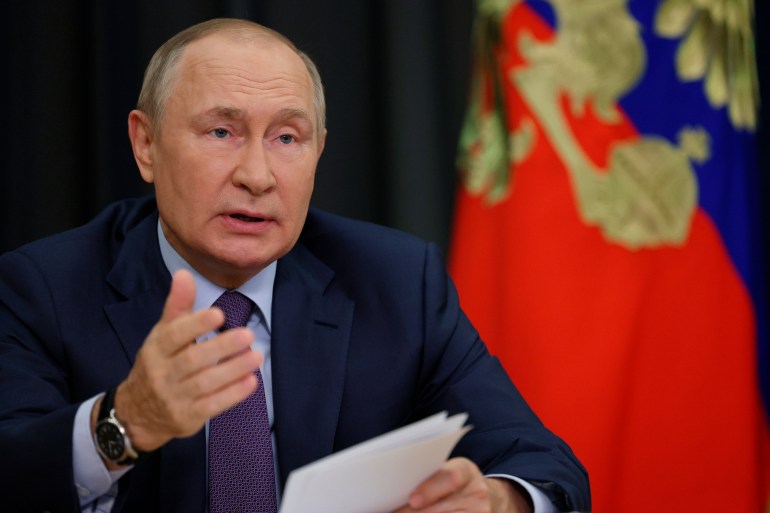Putin’s Central Asian allies embrace Russians fleeing draft
Moscow’s traditional allies in Central Asia are quietly making moves that are likely to upset the Russian leader.

Kyiv, Ukraine – The Kazakh president began his speech with a proverb.
“Good ties with neighbours guarantee safety,” Kassym-Jomart Tokayev, a former foreign minister known for his negotiating skills, said on Tuesday.
Keep reading
list of 4 itemsPutin’s suicidal gamble
Putin grants Russian citizenship to US whistleblower Snowden
Russians flock to Georgia, again, as Putin escalates war
But what he went on to say may seriously strain Kazakhstan’s ties with its giant northern neighbour and former imperial master.
Tokayev instructed his government to help tens of thousands of Russian men that flooded his nation because of the chaotic and massive partial military mobilisation for the war in Ukraine.
Almost 100,000 Russians have entered Kazakhstan since September 21, when Russian President Vladimir Putin announced the mobilisation, the Kazakh interior ministry said on Tuesday.
“Most of them have to leave because of the hopeless situation. We have to take care of them and secure their safety,” Tokayev said.
Ex-Soviet and mostly Muslim Central Asia has been a major source of labour migrants to Russia for decades.
Some have reported facing xenophobia in Russia and complained about the practices of Russian police and their employers.
Central Asia is also still home to various numbers of ethnic Russians whose forefathers migrated in the Soviet era as communist Moscow tried to develop the region.
These days, Central Asian governments allow the new wave of Russians – but fall short of supporting or denouncing the Ukraine war.
Kazakhstan is the only exception.

On Monday, Kazakhstan’s foreign ministry said it would not recognise the “referendums” in occupied Ukrainian regions that paved the way for their annexation by Moscow.
And in June, Tokayev nonchalantly told Putin that his government would not follow Moscow in recognising the “independence” of separatist statelets in Ukraine’s Donetsk and Luhansk.
Kazakhstan’s interior ministry said that it would only extradite the Russians who have been put on an international wanted list.
“A search for Russians by conscription offices is no ground for extradition,” Minister of Internal Affairs Marat Akhmetzhanov said on Tuesday.
The number of newcomers to Kazakhstan is growing by the minute as rights groups and independent media report that newly mobilised Russians are herded to the front lines without any prior training.
“They don’t take part in drills, don’t undergo a medical examination and get no training,” the Perviy Otdel (First Department) Russian human rights group said on Tuesday.
Kazakhstan allows Russians to cross its borders without foreign passports. Mostly arrive via the land border that stretches 7,644 kilometres (4,750 miles).
Thousands of cars and buses are stranded in lines at 10 border crossings, and waiting times vary from three hours to three days, according to activists monitoring the border.

Plane tickets are next to impossible to get.
“We only got a train ticket to Kyzylorda,” the father of a university graduate from Moscow, who may be drafted, told Al Jazeera, referring to the southern Kazakh city.
Hotels, hostels and private housing in northern Kazakhstan have been so jam-packed that the owner of a movie theatre in the border city of Oral made headlines after letting homeless Russians sleep on the premises free of charge.
And the newcomers are easy to spot.
“They’re everywhere. You can tell them by the accent, by the way they look around,” Boris Nepomnyashchiy, a software developer in Almaty, Kazakhstan’s financial capital and largest city, told Al Jazeera.
Even though Kazakhstan has the largest share of the ethnic Russian population in Central Asia, most of the newcomers see it as a temporary shelter until they find plane tickets to other nations.
Western sanctions curbed the number of airlines working in Russia – and skyrocketed ticket prices.
“The possibility of using our sky harbours by Russians for their relocation is one of the reasons the immigrants are coming,” migration official Aslan Atalykov reportedly said.
Two-thirds of the 100,000 newcomers have already left, and only about 8,000 received a taxpayer’s code necessary for opening a bank account or getting a temporary residence permit, the Orda.kz website reported, quoting Ministry of Internal Affairs data.
Some flee to Uzbekistan, Central Asia’s most populous nation that lies south of Kazakhstan – and desperately look for accommodation.
“I can’t handle the influx,” said Timur Karpov, who owns an art gallery in the Uzbek capital, Tashkent, and has been helping dozens of Russians who left after the war in Ukraine began.
“I moved to my parents’ place because there are two families living in my apartment,” Aleksey, an advertising executive, told Al Jazeera.
But when it comes to challenging or contradicting Putin, Uzbek authorities have been much more cautious than the Kazakhs.

Uzbek President Shavkat Mirziyoyev has neither supported nor denounced the war.
He fired Abdulaziz Komilov, his foreign minister who in March said that Tashkent does not recognise the separatist statelets.
But ultimately, no Central Asian nation has recognised the self-described people’s republics of Donetsk and Luhansk.
“Tashkent is silent so far. Which denotes the super-cautiousness of Mirziyayev, his fear of damaging ties with Moscow,” Alisher Ilkhamov, the Uzbekistan-born director of Due Diligence Central Asia, a think-tank in London, told Al Jazeera.
“This borders on cowardice and a lack of principles in how he builds his foreign policies,” he said.
However, Uzbekistan’s Spiritual Administration, the main government body that oversees religious affairs, issued a fatwa on September 23 that forbids Uzbeks from enlisting in the war.
Uzbekistan’s silence may have been caused by the fear that Russia may expel the at least two million Uzbek labour migrants working in the country.
The Kremlin has often resorted to mass detentions and deportations of labour migrants from ex-Soviet nations as a tool of pressuring their governments.
And average Uzbeks are compassionate about how residents of Russia’s Muslim and Turkic-speaking regions resist the forcible mobilisation.
“Supporting the Kremlin is more and more shameful because it is seen as betrayal of ethnic and religious kin,” Timur Numanov, a blogger in Tashkent, told Al Jazeera.
‘Kill an imperialist’
While authoritarian Turkmenistan left Moscow’s political orbit years ago and keeps its borders sealed, two remaining Central Asian nations, Tajikistan and Kyrgyzstan, are part of Moscow-dominated political and economic blocs.
Like Tashkent, their governments have not supported the war – but have never criticised it.
And their cities have also seen a steady stream of draft dodgers.
Kyrgyz migration officials have not reported the number of Russians who entered their nation after September 21, but a Welcome to Kyrgyzstan Telegram group for them has swelled and boasts thousands of members.
In Tajikistan, whose nationals are so ubiquitous in Russia that the term “Tajik” has for years been shortsightedly applied to any Muslim labour migrant, there were new jokes about incoming Russians.
One mirrored the perennial complaint of xenophobic Russians about Tajik cabbies who speak poor Russian and do not know the cities they are driving in.
“Russian drivers don’t know the city and don’t speak Tajik,” goes a new jibe coined in the Tajik capital, Dushanbe.
Russian fugitives are also being forced to forget what some critics have called a sense of imperialist arrogance towards former Soviet nations that have for decades been seen as “younger brothers”.
A guide on relocation to Central Asian nations published by the Republic.ru online magazine in May begins with these words: “It’s time to kill an imperialist in yourself – if you haven’t done it already.”
So for the first time in its history, Central Asia is hosting many opposition-minded Russian nationals.
But it is hard to predict how their presence will change the balance of power between the region and Russia, observers said.
The long-term economic effects are also difficult to fathom, said Temur Umarov, an expert with Carnegie Politika, a think-tank.
“The situation is neither cosy nor comfortable, as the multitude of newcomers looks like a short-term chance to boost certain economic indexes,” he told Al Jazeera.
“But in the long term, they are a burden, because it is unclear how these people can adapt, can find jobs without becoming dependent.”